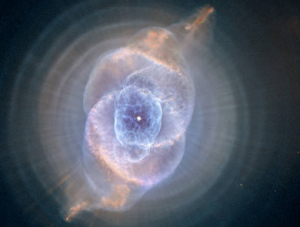
Arquivo para April 24th, 2015
Hubble, infinite and postmodernity
Twenty-five years ago, exactly on April 24, 1990, the space shuttle Discovery took off to put in orbit an observatory with a telescope Hubble, placed in orbit around the planet, that would change our view of the universe, our physical vision and perhaps the life.
orbit an observatory with a telescope Hubble, placed in orbit around the planet, that would change our view of the universe, our physical vision and perhaps the life.
It was observed points that were previously inaccessible to the human eye and were mysteries for researchers. As the Cat’s Eye Nebula (photo) detected in 2004, a nebula that is 3,000 years light of Earth, a nebula is a sun passing to eject their gases before settling as a solar star. As well as the nebulous Carina, 7500 light years from Earth, formed by gas and dust that allows astronomers to study details of star formation, the photo was captured in 2007.
The Copernican revolution that swept the geocentric vision, idea that the earth was the center of the universe, helped to release the ideal teocêntricos man confused and bring out the science and modernity, which now also are in crisis, but the fact that we see further may cause our myopia is exceeded and we start to look the Other not as an extension of self and the Same, but with equal rights that I.
Since the Third Meditation Cartesian, the philosopher Emmanuel Levinas established in their entirety and Infinite work, there is a break from the category of totality, which is based on the relationship between the cogito and the infinite idea developed in Descartes, and where Levinas extract your project to rethink the relationship between the Same and the Other ethics as first philosophy plan:
“And I do not believe that do not understand the infinite by a true idea, but only by a denial of the infinite .. unlike understand quite obvious that there is more reality in infinite substance than in finite and, therefore, that the perception of infinity is, in a way, me earlier perception of the finite, that is, the perception of God is prior to the perception of myself, for which reason it would give me that doubt, desire, that is, I am needy of something and I’m not totally perfect, if there was in me any idea of a more perfect being by comparison with which I know my faults?” (Descartes, 2004, p. 91-92).
Levinas reflects first about his “doubts everything” that conflicts with the external perception of the infinite idea, since it is no longer the cogito (systematic doubt) you think the infinite, but comes from the “I think” and should be the very idea of infinite substance (now seen by Hubble), the second is inadequate, because the infinite is not an overflow of ideatum, but the external relation that admits the experience with the new, the thoughtless and therefore outside the entirety.
In this infinite “thoughtless” that Levinas says Even the relationship with the other, “without the transcendence of cutting the ties that implies a relationship …” (Levinas, p. 35), and this way Levinas shows how modernity fixed this relationship on the basis of “I think” itself of modern rationalism, and this is the distance between the idea of the Other with ideatum standing in “transcendent being, the infinite is the absolutely other” (Levinas, Totalidade e Infinito, p . 35-36).
It is in this way that separates the infinite idea of Descartes that is the philosophical search for God’s existence, as in Levinas is linked to the search for a relationship between the Same and the Other, to keep the externality of the Other, and not attached to idea Same.
Descartes, R. Meditations on First Philosophy. Sao Paulo-Campinas: Editora da UNICAMP, Campinas, 2004.
Levinas, E. Totalidade e Infinito. Lisbon-Portugal, Edições 70, 1988.

